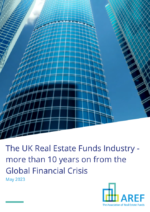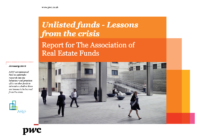
In July 2007, Lehman Brothers purchased the recently-built high-rise Parisian office Cœur Défense for €2.1bn – a transaction with a minimal equity component.
At the very same time, the IPD index started to turn southwards, in a move that would portend thew chaos to follow.
Lehman’s vast, debt-saturated, peak-of-the market transaction would be judged poorly by history. It was also a poster child for the leverage-fuelled transformation of both UK and European real estate markets.
Just over a year later, 15 years ago to the day, Lehman Brothers filed for bankruptcy. The fourth-largest U.S. investment bank had $639 billion in assets and $613 billion in debts1.
If there was a poster child for the whole financial crisis, Lehman Brothers is a good candidate.
In European real estate, the intervention of banks such as Lehman, plus private equity companies and other investors, had introduced a culture of excessive leverage.
Fifteen years on, the culture has all but disappeared.

In fact, a new research report by the Association of Real Estate Funds (AREF), available for download here, contends the UK real estate industry remains unrecognisable from the one that entered the crisis.
With an almost universal conversion to a low or even no debt investment philosophy, and improved standards of governance, the industry has successfully implemented the raft of regulatory changes that came out of the lessons of 2007 and 2008.
Our research also shows how the unlisted real estate industry has grown significantly in the intervening period.
Aside from decarbonisation, the most significant structural challenge facing the industry could not be more different from the now-gone culture of leverage. It is the slow decline of defined benefit pension schemes, the rise of defined contribution schemes, and the necessity of seeking appropriate structures and entry points to comfortably accommodate the latter, as they grow in scale and influence.
Building better ways for DC schemes to allocate to real estate is one of the most important areas of policy work for AREF – for example as we address issues in platforms and highlight the advantages of ideas such as collective DC.
Our new report also addresses the current issues of the structural demise and the challenges faced by low fee levels.

Its findings echo those of a report we commissioned in 2012 – while the embers of the crisis glowed brightly. It is available on our website here.
Then, some fund managers argued they were hamstrung from taking appropriate action by the terms of fund documentation or regulation.
What really shone through in the report, was the importance of communication and transparency.
Research showed that fund managers must provide investors with sufficient clarity about their decision making. This would enable enhanced assessment of the way the fund manager is addressing trade-offs between liquidity, volatility, performance and risk.
The transparency debate has since moved on. Our new research report shows that the contemporary discussion points about transparency concern fees and data.
AREF has the opportunity to stand with the UK real estate fund industry and help it grow in size via the provision of improved data transparency and relevance, to help with the expansion of new investment areas and the continued support of investor interest with the publication of benchmarks.

